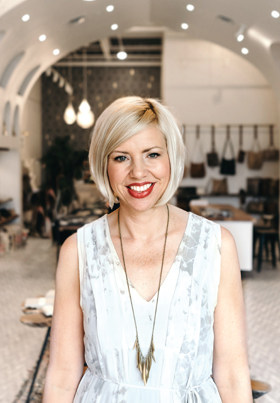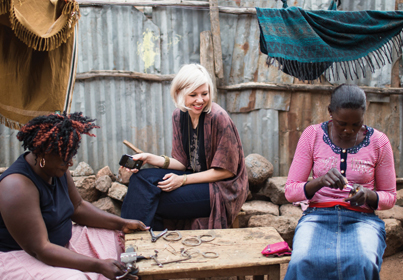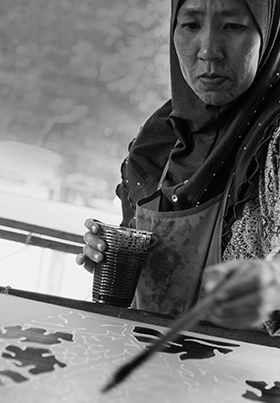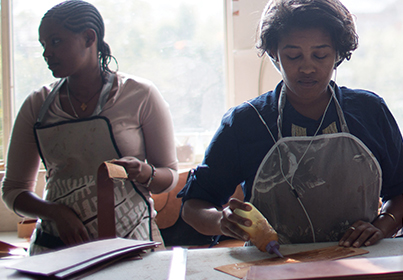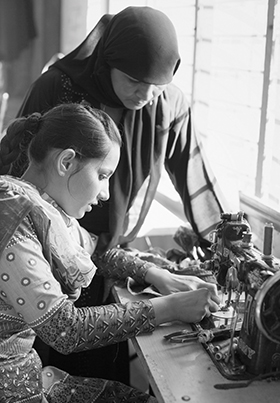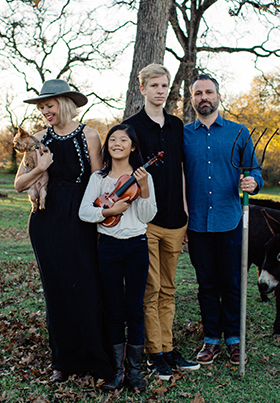Slow Revolution
Baylor alumna Kirsten Dickerson leads a "slow fashion" revolution and helps alleviate poverty among women worldwide
In recent years, many media outlets have reported on the damaging effects of "fast fashion"--cheaply made clothes by brands like H&M, Zara and Forever 21--on the environment and the people who manufacture them. According to the 2015 documentary The True Cost, fashion is the second-largest source of pollution in the world. In the last two decades, the amount of clothing Americans throw away each year has grown from 7 million to 14 million tons, or 80 pounds per person each year. One in six people worldwide are employed by the fashion industry, 80 percent of whom are women; and the majority of those women are paid less than a livable wage, often surviving in poverty.
As the West gradually wakes up to the true cost of fast fashion, companies like Raven + Lily, the brainchild of Kirsten Dickerson, BA '96, are leading a "slow fashion" revolution, offering socially and environmentally conscious alternatives for thoughtful consumers.
"In the West, we want clothes cheap and fast, and no clothing recycling program could possibly keep up with the waste that's generated," Dickerson says. "When we get a good deal, we tell everyone about it, but we're bragging at the expense of someone on the other end who was cheated."
As it exists today, Raven + Lily represents eight years of growth from a non-profit project into a full-fledged company with two store locations in the Austin area. The newer of the two, located at The Domain in Austin, Texas, is simply yet meticulously curated--a reflection of the Raven + Lily aesthetic, Dickerson's personal inclination toward minimalism and the uncommon transparency with which she operates her business.
"With this storefront, we can say these are the designs of over 1,500 women from 10 different countries in Asia, Africa, Latin America, and also women here in the U.S." she says. "The style of Raven + Lily is focused on honoring the beauty and cultures of these women but in a modern way."
In Kibera, Kenya, women are hired and trained to create recycled brass jewelry, providing an avenue out of poverty and into empowerment. From the chain to each individual charm, artisans create these modern designs with incredible attention to detail.
Raven + Lily has forged and maintains 19 artisan partnerships--carefully and prayerfully chosen communities of women, skilled in areas such as embroidery, sewing or jewelry-making. The story behind each partnership is unique, but all have experienced suffering in various forms, including illness, abandonment, displacement due to war and extreme poverty; some, desperate for opportunity, are vulnerable to labor trafficking. Each operates as its own small business, fulfilling orders for a wage that allows for healthcare, an education for their children, a voice within the larger communities that have silenced them, and an opportunity to break a vicious cycle of poverty.
"We have an in-house design team that has a direct relationship with each of those 19 partnerships and we design to the skills and strengths of those women artisans, utilizing local eco-friendly materials," Dickerson says. "As much as possible, the basic materials we're sourcing have a good story as well, all the way down to the buttons on our jackets. So we think about every step of the process. But our main goal is to design to the women’s skills--designs that will sell and are scalable."
Dickerson is proud of the brand's Benefit Corporation (B Corp) certification and its Fair Trade Federation membership, both of which speak to the company's commitment to ethical business as it affects the consumer as well as the women who make the clothes, accessories and home décor items for sale in the store.
"Fair Trade Federation membership has to do specifically with how we treat the artisans on the ground, how we pay them, and the environment they work in," she says. "Our B Corp certification really speaks to how we operate as a company, maintaining the highest level of transparency for a U.S.-based company. Every category of our business is evaluated and graded, then the grades are publicly posted. We have won Best for the World for Community Impact two years in a row now. So, of 1,863 companies that have this certification, we are among the top in terms of community impact in the world."
It was in the interest of fair trade that Dickerson launched a home décor line of products such as tabletop décor and pillows hand-embroidered by a community of Afghan refugees who have settled precariously at the Pakistani border, as yet unable to integrate into either country. Dickerson learned of the women surviving in these border camps when Artisan Resource, a New York-based, biannual tradeshow, contacted her for help.
"One of the reasons I launched home décor is that it’s an easier way to keep some of the groups employed between seasons of jewelry and apparel production," she says. "What a lot of big companies do is they'll come in and place one order for a single product, and then never again. This can establish false expectations. And oftentimes these groups of artisans have invested in a lot of equipment to complete the order. That's not fair trade. Fair trade and ethical production means we are building long-term, trusting relationships with people and that we are scaling together so our artisans know how to prep on their end, and we know how to prep on our end."
A Baylor-born mission
Dickerson's passionate advocacy for women and their children began while she attended Baylor. While she was in Waco, studying to become a teacher, her parents divorced and her father went missing for two years. Financial hardship nearly prevented her from graduating.
"When my dad disappeared, it was a traumatic experience," she says. "And in the summer before my junior year (1993), without going into details, we lost everything. Our family had fallen apart and so did our finances, and it had such a negative effect on my mother. I had to make the decision on behalf of my mom and my sister to move in with an aunt in Pennsylvania."
Knowing her daughters could not afford to return to Baylor, Dickerson's mother made a phone call to the university to explain their circumstances.
"What ended up happening was my sister and I were gifted an anonymous scholarship," Dickerson says. "They told my mom, 'Send your girls back. We will take care of their education.' So we were able to finish at Baylor. I held down three jobs, but I finished."
The generosity she was shown by Baylor and by her Pi Beta Phi sisters--who gifted her dues every year, frequently stocked her shelves with food when cash was scarce and bought her a red gown to wear to the sorority's annual Fire Dance one fall--remains a testament to the providence and faithfulness of God.
"Honestly, I think in some ways I experienced the loss and suffering that a lot of Raven + Lily's women artisans experience, but the generosity of others really encouraged me," she says. "Those experiences showed me that God was real because even when I had lost my father, my family, our home, my faith was stronger than ever. My roommates and I memorized James 1 that junior year. We memorized and talked about it together all year. When I would sleep at night, that's what I heard in my dreams. I've never forgotten it. I came out of that year thinking, 'I'm going to trust God and go wherever He calls me.'"
Women in Addis Ababa, Ethiopia cut, sew, stamp and package Raven + Lily's unique and top-selling leather goods. The leather is locally sources from one of the best tanneries in Africa, using 100% natural vegetable dye.
In the following years, Dickerson studied in Kenya with the first Baylor in Africa cohort, lived in Estonia for a full year, mentoring college students, and became deeply involved with Mission Waco and Campus Crusade (now called CRU). All the while, she says, God was growing her heart for those who suffer. The day after she graduated from Baylor in 1996, Dickerson boarded a plane bound for India to volunteer with Mother Teresa--now Saint Teresa of Calcutta--and Missionaries of Charity. For two weeks, she toured with a group from Mission Waco to a number of locations, but decided to remain an additional six weeks in Calcutta, which was renamed Kolkata in 2001. Dickerson worked with the dying in a free hospice for the poor and in an orphanage, bearing witness to unconscionable depths of poverty and injustice.
"I chose to stay in Calcutta after everyone else in the group had left because, out of everywhere we visited, that was the hardest for me," she says. "It was so hot; there was so much suffering and poverty. Everywhere I walked, women were begging and 5-year-olds were holding and caring for babies. This was poverty on a level that I didn't understand. Bands of children were having to raise babies who had been abandoned. Volunteering with Mother Teresa was very, very, very hard work, and something that I couldn't fully wrap my head around; but, it taught me so much about suffering and my motivation as a Christian."
Building on the transformational experiences gained during her college years, Dickerson led a number of local and global missions through Ecclesia Hollywood, a Los Angeles church she and her husband planted in 2005. She visited several sewing and jewelry-making studios in India and Africa that employed marginalized women. It was during that time that she began to envision a non-profit model aimed at promoting dignity and alleviating poverty through employment. The first iteration of Raven + Lily launched in 2008 as a 501(c) organization fiscally sponsored by a larger, like-minded non-profit.
"I learned a lot, and I learned that the best ways to care for the poor are models that are about valuing people and empowering them," Dickerson says. “And I actually believe that business is the key to alleviating most poverty in the world--business creation and job creation done in an ethical way."
In 2013, Dickerson applied to SKU, an Austin-based accelerator, or incubator, for consumer product startups, providing infrastructure and operations support, entrepreneurial mentorship, education for startup owners and access to funding.
Since their for-profit launch, Raven + Lily has seen 1,000 percent scaling; and, with the opening of their newest storefront, Dickerson expects to almost double last year's revenue by the end of 2016.
"Magnolia is our largest account because Joanna's [Gaines] favorite bags are Raven + Lily bags," Dickerson says. "A lot of the jewelry you see her wearing on Fixer Upper is Raven + Lily. They sell a lot of it at their store and online."
The Kerem Remnant Leather Bag is now made exclusively for Magnolia and comes from an artisan partnership based in Addis Ababa, Ethiopia, a place where most women in their teens and 20s are poorly educated and often HIV positive. With few or no economic opportunities, they are vulnerable to labor trafficking.
"They will be offered a 'job' that requires them to go to the Middle East to work for a wealthy family," Dickerson says. "They don't usually realize the circumstances they're getting into. And a lot of the time, they find themselves in a slave-labor situation and are never heard from again. They don’t speak the language; they aren’t aware of their rights. They are extremely vulnerable."
The partnership in Addis Ababa came by a connection to Beza International Ministries. The pastor's wife, Yami, is a friend of Dickerson's and wanted to use her design talents to give other Ethiopian women a chance to provide for themselves and their children. It took a full year for her to complete all the paperwork required to establish a business in Ethiopia, but Raven + Lily sold out of her debut bag--the Yami bag--immediately.
"Yami began with just two women, and now she employs 35 to 40 women, and only within a couple of years," Dickerson says. "It began with one bag and now includes an entire collection. Her heart’s desire was to employ women who are vulnerable to human trafficking, help them stay in Ethiopia, thrive, and have a family."
Another large partnership, established in 2008 and also through Beza International Ministries, employs about 150 women from a community outside Addis Ababa. These women, who make beaded jewelry for Raven + Lily, are all HIV positive and have been abandoned by their husbands, their families and ostracized because of their poorly understood disease.
"They go to this mountain outside Addis Ababa, where they believe there is holy water that can cleanse them of their disease," Dickerson says. "As a result, there is a slum community on this mountain. It's a place of terrible suffering."
Beza International Ministries was concerned for these women and taught a few of them to make necklaces out of coffee beans to be sold in the markets, the proceeds of which went back to the women and helped to buy medicine, educate them about healthcare, and secure tutoring for their children. Beza International Ministries continued to operate this non-profit until inviting Dickerson to visit.
"I went up to the mountain," Dickerson says. "I was like, 'OK, but Raven + Lily isn't going to sell coffee bean necklaces.' So we created designs that the women could replicate and we found basic beads in the markets that were actually made from melted down bullet casings. Farmers find these bullet casings in their fields and they are taken to one of the three villages we’re working with. They are melted down over a coal fire and each bead is hand-formed and polished."
Dickerson's team taught the women living on the mountain how to make two designs, at which they became very proficient. Unsurprisingly, the first batch of necklaces Dickerson brought back to the U.S. sold out immediately.
"They have become their own for-profit business within Ethiopia, employing about 150 women and their children are in school," Dickerson says. "The story of these beads is redemptive because what was once meant for harm--the bullets--has now brought hope and life to these HIV-positive women."
As passionate as she is about empowering women artisans around the world, Dickerson also believes in empowering American consumers to make mindful decisions about how and where to spend their money. She has spoken at numerous conferences from Los Angeles to New York, including South by Southwest (SXSW) in Austin, and she has lectured in classrooms at the University of Texas, Fashion Institute of Technology in New York, and others.
Her integrity and conviction are also evident in her personal life. Little more than two years ago, she and her husband, filmmaker Brandon Dickerson, BA '94, and their two teenage children downsized from a comfortable life in the suburbs to a 400-square-foot "tiny house" on 12.5 acres in the country east of Austin.
"I am one blessed guy," Brandon says of his wife. The couple married mere months after Kirsten's return from India in 1996. "Kirsten is the real deal, and I am absolutely the president of the Raven + Lily fan club."
The decision to pursue a simpler life was one all four Dickersons made as a family, requiring them to give away 80 percent of their belongings. To this day, their tiny life forces them to make mindful choices about what to buy, what to keep and to resist what Dickerson calls the tyranny of the urgent.
"I think when people hear about or talk about 'caring for the environment,' they think about it in political terms, but I believe we need to care about the environment because it affects people," she says. "I have no desire to make people feel guilty. You don't have to solve everything right now, but you can start with one item. Any time you want to gift something or buy something for yourself, you can slow down, do your research and choose to invest that money ethically. What we put in our body matters and what we put on our bodies matters--it matters to God because it matters to other people.
